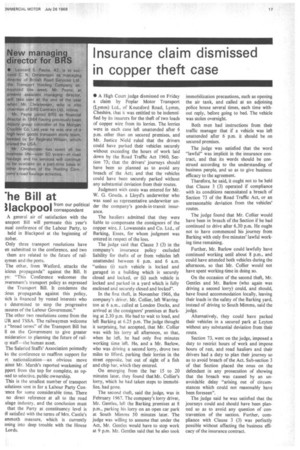Insurance claim dismissed in copper theft case
Page 19

If you've noticed an error in this article please click here to report it so we can fix it.
• A High Court judge dismissed on Friday a claim by Poplar Motor Transport (Lymm) Ltd., of Knutsford Road, Lymm, Cheshire, that it was entitled to be indemnified by its insurers for the theft of two loads of copper wire from its lorries. The lorries were in each case left unattended after 6 p.m. other than on secured premises, and Mr. Justice Nield ruled that the drivers could have parked their vehicles securely without exceeding the hours of work laid down by the Road Traffic Act 1960, Section 73; that the drivers' journeys should have been so planned as to avoid any breach of the Act; and that the vehicles could have been securely parked without any substantial deviation from their routes.
Judgment with costs was entered for Mr. W. G. Gouda. a Lloyd's underwriter who was sued as representative underwriter under the company's goods-in-transit insurance.
The hauliers admitted that they were liable to compensate the consignors of the copper wire, J. Lowenstein and Co. Ltd., of Barking, Essex, for whom judgment was entered in respect of the loss.
The judge said that Clause 3 (3) in the company's insurance policy excluded liability for thefts of or from vehicles left unattended between 6 p.m. and 6 a.m. "unless (i) such vehicle is locked and garaged in a building which is securely closed and locked, or (ii) such vehicle is locked and parked in a yard which is fully enclosed and securely closed and locked".
In the first theft, in November 1966, the company's driver, Mr. Collier, left Warrington at 6 a.m., called at London Docks, and arrived at the consignors' premises at Barking at 2.30 p.m. He had to wait to load, and left Barking at 6.25 p.m. The judge thought it surprising, but accepted, that Mr. Collier was with his lorry all afternoon, so that, when he left. he had only five minutes working time left. He, and a Mr. Barlow, who was driving a second lorry, drove two miles to Ilford, parking their lorries in the street opposite, but out of sight of a fish and chip bar, which they entered.
On emerging from the bar 15 to 20 minutes later, they found that Mr. Collier's lorry, which he had taken steps to immobilize, had gone.
The second theft, said the judge, was in February 1967. The company's lorry driver, Mr. Gentles, left the Barking premises at 8 p.m., parking his lorry on an open car park at South Mimms 50 minutes later. The judge was willing to assume that under the Act, Mr. Gentles would have to stop work at 9 p.m. Mr. Gentles said that he also took immobilization precautions, such as opening the air tank, and called at an adjoining police house several times, each time without reply, before going to bed. The vehicle was stolen overnight.
Both men had instructions from their traffic manager that if a vehicle was left unattended after 6 p.m. it should be on secured premises.
The judge was satisfied that the word "lawful" was implicit in the insurance contract, and that its words should be construed according to the understanding of business people, and so as to give business efficacy to the agreement.
Therefore, he said, it ought not to be held that Clause 3 (3) operated if compliance with its conditions necessitated a breach of Section 73 of the Road Traffic Act, or an unreasonable deviation from the vehicles' routes.
The judge found that Mr. Collier would have been in breach of the Section if he had continued to drive after 6.30 p.m. He ought not to have commenced his journey from Barking with only five minutes' lawful working time remaining.
Further, Mr. Barlow could lawfully have continued working until about 8 p.m., and could have attended both vehicles during the afternoon, so that Mr. Collier would not have spent working-time in doing so.
On the occasion of the second theft, Mr. Gentles and Mr. Barlow (who again was driving a second lorry) could, and should, have found accommodation locally, leaving their loads in the safety of the Barking yard, instead of driving to South Minims, said the judge.
Alternatively, they could have parked their vehicles in a secured park at Leyton without any substantial deviation from their route.
Section 73, went on the judge, imposed a duty to restrict hours of work and impose hours of rest, and road hauliers and their drivers had a duty to plan their journey so as to avoid breach of the Act. Sub-section 3 of that Section placed the onus on the defendant in any prosecution of showing that the breach was caused by an unavoidable delay "arising out of circumstances which could not reasonably have been foreseen".
The judge said he was satisfied that the journeys could and should have been planned so as to avoid any question of contravention of the section. Further, compliance with Clause 3 (3) was perfectly possible without affecting the business efficacy of the insurance contract.












































































































